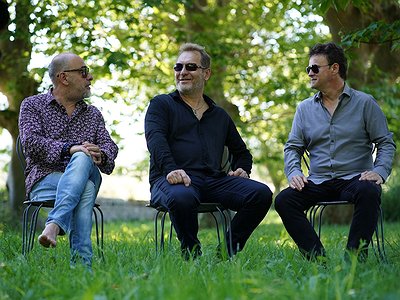Name: Thierry Maillard
Occupation: Pianist, composer, improviser
Nationality: French
Recent Release: Birka, Thierry Maillard's new release with the MLB Trio, further made up of Sylvian Luc and Stephane Belmondo, is out via Ilona.
If you enjoyed this interview with Thierry Maillard, visit his official homepage for updates and more information. He is also on Instagram, Facebook, and twitter.
Tell me about your instrument and/or tools, please. How would you describe the relationship with it? What are its most important qualities and how do they influence the musical results and your own performance?
The piano is the perfect orchestral instrument for composing, the sound of the piano is perfectly suited to my personality when I compose.
What do improvisation and composition mean to you and what, to you, are their respective merits?
I have always considered myself more as composer than improviser. Improvisation is a form of freedom that is useful in jazz, but for me it is secondary.
My musical influences are the great orchestra and great composers like Stravinski or Bartók. Chick Corea was also very influenced by its composers. I feel totally part of this movement.
Derek Bailey defined improvising as the search for material which is endlessly transformable. Regardless of whether or not you agree with his perspective, what kind of materials have turned to be particularly transformable and stimulating for you?
I find improvisation interesting when it comes to an exchange with other musicians and therefore musical personalities. The stimulation for me comes from the wealth of a composition - without composition there is no improvisation for me, unless we're enaging in free jazz.
Purportedly, John Stevens of the Spontaneous Music Ensemble had two basic rules to playing in his ensemble: (1) If you can't hear another musician, you're playing too loud, and (2) if the music you're producing doesn't regularly relate to what you're hearing others create, why be in the group. What's your perspective on this statement and how, more generally, does playing in a group compare to a solo situation?
He is right about his 2 points. Now the important thing I find is that a musician brings his personality and influence into his solos. I don’t like soloists at all who are well taught in school-taught harmony and improvisation! I always fled the schools for this.
For me, we should first look for the personality of a musician before teaching him improvisation.
There are many descriptions of the ideal state of mind for being creative. What is it like for you?
The state of mind is obviously important but always for me linked to the style of music to play.
What supports this ideal state of mind for your improvisations and what are distractions?
The style of music and the musicians with whom one plays it with; the influence of the desire that I can have improvised or not.
Are there strategies to enter into this state more easily?
Not really.
Can you talk about how your decision process works in a live setting?
In general, musicians of a group are taken for their instrumental quality but also soloist if indeed it is music or improvisation. I find improvisation can become painful if it does not have a real sense or style. This explains my preference for Frank Zappa, since he always first created a composition
How do you see the relationship between sound, space and performance and what are some of your strategies and approaches of working with them?
It depends on music, style and composition.
How is playing live in front of an audience and in the studio connected?
The sound space is of great importance. But once again it is the composition that inspires or fails to inspire an improvisation.
What do you achieve and draw from each experience personally?
For me there is a difference between improvisation in public and in the studio. I think in the studio there is a deeper search, while in public it is the moment, that premium you play something first for the public.
Can you talk about a breakthrough work for you?
Composing for the Prague symphony orchestra will remain for me one of the greatest moments of my career. Another are my contemporary music compositions for classical artists. My last 2 albums with a big band in 2018 and 2020 are also a search for composition and influences by musicians like Frank Zappa.
In a way, improvisations remind us of the transitory nature of life. What, do you feel, can music express about life and death which words alone may not?
I started improvisation like a lot of musician, with blues and altered ranges, harmony. I listened to Bill Evans and his harmonic wealth. Music and composition are for me the reflection of my soul and it is easier to write it in music than with words.
A composer like Amadeus Mozart would have been a great inspiration for me on the strength of composition in terms of the emotions of life and death.




